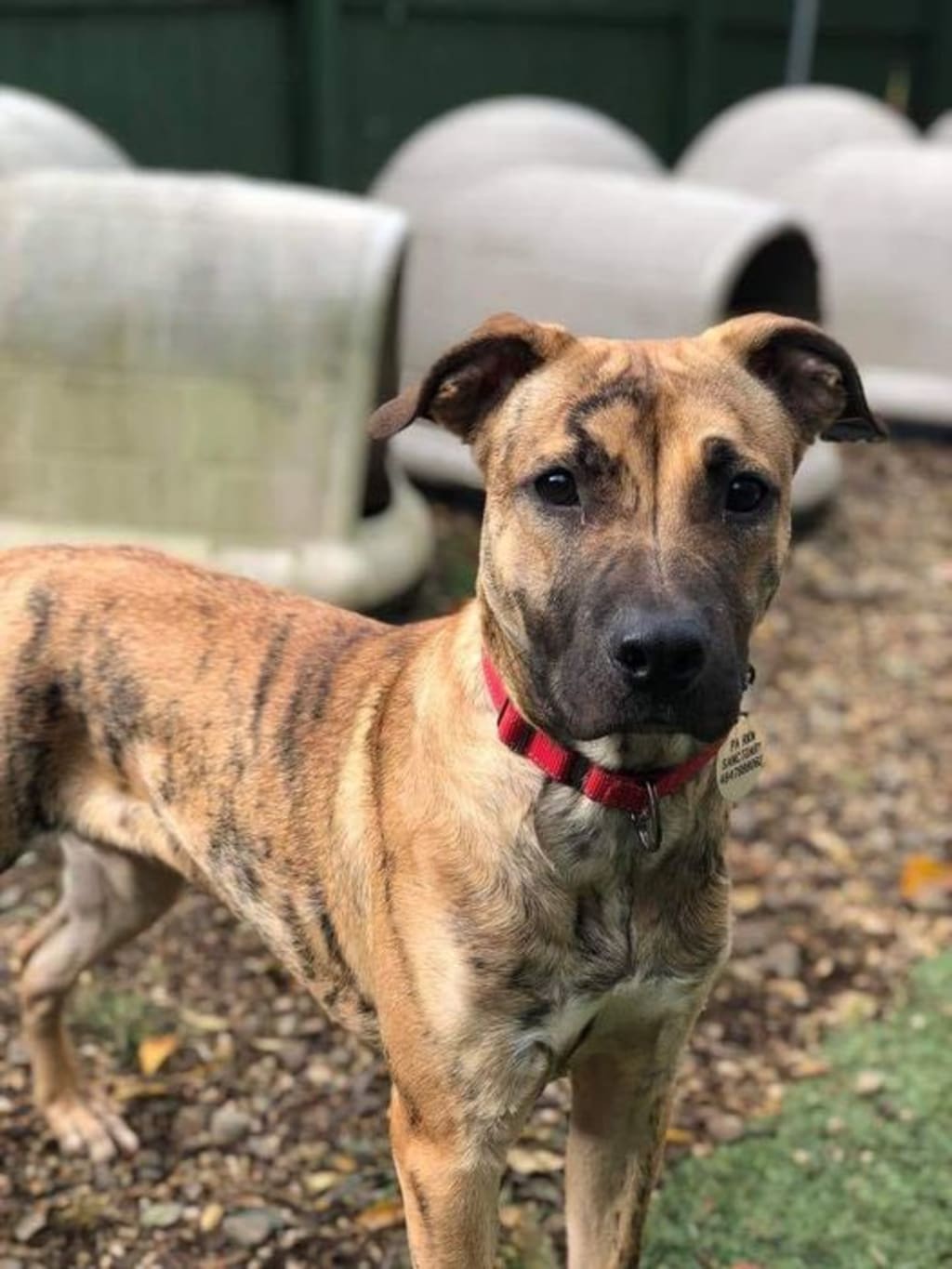Saving Shadow
There are a lot of ways to mess up a dog

There are a lot of ways to mess up a dog.
Abuse is the first thing that comes to mind, especially when talking about rescues. We expect dogs that have been beaten to have behavior problems and many of them do. But a lot depends on how old the dog was when the abuse began, how severe it was, and how long it continued. Many abused dogs are actually starved for human affection and will bond tightly to the first person who gives them consistent kindness and care.
My first rescue, Max, fit this model. He was abused and neglected, chained outside with sketchy shelter and given inadequate food and no veterinary care. He came to me 40 pounds underweight, Lyme positive, recently treated for heart worm, and neutered mere weeks before at the age of around 2. He was so hand shy from having been hit that it was hard to even pet him without making him flinch and cower. Any sudden noise terrified him, and he had actual night terrors during which he would tremble violently, cry, and wet himself. It must have been a brutal life but most of the scars it left on Max were emotional not physical, other than the damage from being chained which gave him a distinctive, lifelong cough. There is no mistaking that cough if you've ever heard it.
Max never did get over his fear of loud noises. Thunder and fireworks would send him running either under my husband's desk or into the stall shower. And while he eventually learned to enjoy the company of other dogs on neutral turf like daycare, he remained very territorial and was not at all okay with other dogs anywhere near his house or yard—another hallmark of a dog who spends most of their life chained. But for the most part he got over his generalized anxiety and figured out that the world was a pretty nice place, filled with comfy couches and friendly people who would let him lay in their lap and rub his tummy or scritch his ears. That happened because first he learned he could trust ME, that I would handle all the scary stuff that came along and he didn't need to worry about it. And once he was sure that I had everything under control like a good pack leader should, he could relax and start learning to trust other people, too. It took time (years!), and patience, and training, but by the time he left us he pretty much loved everyone he met and you'd have never known what hell he came from.
So that's one way to mess up a dog. But a lot of dogs in shelters have never been truly abused or neglected. They've been in homes with families that say they want a pet. Most of them mean well. They feed their dogs, take them to the vet, keep them in the house. But they really have no idea of what a dog needs. They get a puppy and shower it with love and attention, but either don't try to train it or go about it with no real plan. They get angry when Rover pees on the rug or when Fluffy chews up their favorite shoes. They get frustrated when little Fido pulls on the leash and stop taking him on walks so he can see and experience new things. They yell at the dog constantly; shove her in a crate as punishment; have inconsistent times for things like meals and potty and play. They treat their puppy like a toy and then, when inevitably that puppy grows into doggy adolescence and starts showing significant behavior problems, they dump the dog at a shelter because they "aren't able to care for him anymore." Now the shelter has a poorly socialized, anxious, untrained 1- to 2-year-old dog to re-home, and the odds aren't great. People want puppies, not projects. And many people who adopt from shelters, while driven by a love of animals and a deep desire to help, just aren't prepared to cope with things like separation anxiety and fear aggression. All too often these dogs wind up right back at the shelter in a few months, starting a downward spiral that can lead to un-adoptable dogs. With any luck, they are at a true no-kill shelter. Otherwise...
From what I know of my current rescue Shadow's story, he fits this pattern. There is no obvious history of any physical abuse or neglect. He seems to have been fed, housed, and basically well cared for. Based on what I've been able to piece together from available records, he's always been a pet who lived indoors with people. His initial vet records list his his name as Diablo, his birth date as March of 2018, and all the routine puppy shots right on schedule. While he was still a pup, his family seems to have moved from Florida to Pennsylvania: vet records show a routine well visit in Florida in September of 2018 and then a rabies certification request in Bethlehem (probably to get a local dog license) later that month. If they knew they were moving, it would have make sense to just get the needed paperwork at the well visit so I'm not entirely sure what happened.
In February of 2019, just a few months after the move and barely a month shy of his first birthday, Shadow was surrendered by his family to the rescue we adopted from. The stated reason was that he had growled at the 10 year old daughter and she was now afraid of him. The surrender form notes he had trouble with men, barked at strangers, and seemed fearful of them. My writer's mind started to fill in a story about what may have happened to provoke a sudden long distance move and wariness around men, but we will never actually know. Behavior issues are very common around 6 months when pups go through their fear stage and this boy also got a major environment change thrown on top. A family with dog experience likely could have helped him work through those issues, but I also understand the instinct to protect one's child and being stressed and maybe overwhelmed by life changes and just not having the emotional resources to deal with a dog that suddenly seems aggressive. So I'm not judging that family; they did take him to a guaranteed no-kill shelter and I'm sure they thought he would find the perfect new home and live happily ever after. That's what everyone thinks when they surrender a dog.
Shelters are always short on resources, space, and volunteers. Even the absolute best shelters can't put every dog through extensive temperament testing or provide much in the way of training or behavior modification. And of course, all they have to go on is whatever the owners are willing to tell them. If a dog with a few issues is lucky, they will land with an experienced foster who can start working with them before they go back out but the goal is always to get pets into good homes quickly so there is room to save the next animal in need. Shadow, being a young, handsome, housebroken dog, was adopted out very quickly. Less than a month after the date on the first surrender form, he was in his new home with his new name and getting routine vet care. It seemed as though he'd gotten just what that first family probably hoped for: his happy ending with a perfect owner.
But 5 months later Shadow was back at the shelter. This time, the surrender form shows an escalation from barking at strangers to growling, fears of both men AND women, and a biting incident involving a visiting family member trying to enter the house. The bite was not serious—no skin was broken—but it's clear Shadow's anxiety and fear aggression was not being addressed and was escalating. He was now close to a year and a half old and on a path toward becoming a very dangerous dog. Where Max had internalized the "flight" side of the equation, Shadow had learned the "fight" response to deal with scary things.
After that second surrender, Shadow spent nearly a year in foster care, which is probably the most stability he'd ever had in his whole life. He was tried with several potential adopters but his temperament issues (growling, especially at men) led every one of them to give him back after the initial introductions. Unfortunately, this just deepened Shadow's wariness of new people. It became a self reinforcing cycle.
After Max passed away, we went looking for another rescue and concentrated on the "difficult" dogs, the ones the rescues were having a hard time placing. Shadow was definitely at the top of that list. When we first met him, we immediately saw the growling, snarling, and snapping. But we also saw a dog who desperately needed a chance. After a three day trial, we made if official and completed the adoption.
Not even 24 hours later, he bit my husband severely enough to require stitches and we definitely wondered if we'd made a mistake. We saw the fear, and the anxiety, and the uncertainty about who to trust. But we also saw the submissive roll overs, the eagerness to please, and the playfulness. So we stuck with it. It took nearly a month before Shadow was truly comfortable with us, a month during which we carefully controlled every aspect of his environment to minimize stress and let him finally decompress. And once he did, we discovered a very sweet and loving disposition under all of that anxiety and fear.
It's a true shame Shadow did not get the kind of socialization and guidance he needed when he was young, because now it will take years of hard work to extinguish that aggressive behavior and recondition him to accept friendly strangers without becoming reactive. It is so much harder to correct a behavior problem than to prevent it in the first place! But as with Max, now that Shadow is secure in our "pack" and knows that we have everything under control, he's more willing to relax his guard and is slowly learning to meet new people with less anxiety. He is learning he can trust us to make the decisions about what is okay, instead of trying to make all those decisions on his own. And he's a much happier dog for it.
Fortunately for Shadow, we have the time and the patience to help him. We have the means to seek out professional training to assist us, and to get veterinary care to deal with the physical issues that may be contributing, including some undiagnosed vision problems. Vision issues that can definitely explain his fearfulness—he knows something is there but can't tell exactly what. I'd be edgy, too! He also has chronic digestive issues related to previous bowel obstruction surgery, and who isn't cranky when they have the runs? His behavior after having accidents in the house made it clear he'd been punished severely for this in the past, even though it was hardly his fault. Instead of punishment, we switched him to a sensitive stomach diet and added probiotics. He showed immediate improvement in both his potty habits and his overall temperament. Anyone at all could have done this, but instead he was yelled at, hit, and abandoned. All because no one bothered to try and figure out what he needed.
Despite all this, Shadow's still one of the lucky ones. He landed at an excellent shelter that is truly no-kill, and they were committed to keeping him until the right placement could be found. But there are THOUSANDS of Shadows out there, puppies ruined by their people and then discarded as soon as they start to act out. Most of them will be destroyed. Because while everyone feels sorry for the beaten dog who cowers, the frightened, anxious dog who shows his teeth is just "mean" and goes to the top of the list to be put down.
There are a lot of ways to mess up a dog. Max was the poster dog for what people usually think of: an abused, neglected, cowering wreck. He could have been on one of those TV commercials with a Sarah McLachlan voice over imploring you to please, PLEASE open your hearts and your wallets and help. That's one way.
But they never show the dogs like Shadow on those commercials. Celebrities aren't raising money to save the dogs that were thrown aside when they became inconvenient, or got too big, or bit someone because no one bothered to give them a proper upbringing. Dogs, like children, require a significant investment in leadership and discipline. They need to be given clear boundaries and lots of love and reinforcement. They need you to BE THERE, 24/7, not just when you feel like it.
If you don't want to make that investment, PLEASE don't get a puppy. Try a nice goldfish instead. Because I can tell you that there simply aren't enough people willing to clean up your mess to go around. Hundred of thousands of dogs are euthanized in shelters every year because humans failed them in some way, and the first ones to go are always the "unadoptable" ones—the ones who have bitten, the ones who growl, the ones whose owners gave up on them. There's no shame in recognizing that you don't have the time or resources to care for a dog. But there's infinite shame in getting one anyway, then walking away when it gets tough. Don't be that person.
Dogs deserve better.
About the Creator
Donna Thiel Cook
Writer, geek, dog lover. Not always in that order.






Comments
There are no comments for this story
Be the first to respond and start the conversation.